
15
© Học viện Ngân hàng
ISSN 3030 - 4199
Tạp chí Kinh tế - Luật & Ngân hàng
Số 273+274- Năm thứ 27 (1+2)- Tháng 1&2. 2025
Động cơ tích lũy dự trữ ngoại hối: Bằng chứng
thực nghiệm tại các quốc gia đang phát triển
Ngày nhận: 30/05/2024 Ngày nhận bản sửa: 17/12/2024 Ngày duyệt đăng: 24/12/2024
Tóm tắt: Sử dụng ước lượng tác động cố định hai chiều với dữ liệu từ 77 quốc
gia đang phát triển giai đoạn 2000- 2022, bài viết cung cấp bằng chứng cho
thấy tích lũy dự trữ ngoại hối xuất phát từ cả hai động cơ: động cơ trọng
thương và động cơ phòng ngừa, trong đó động cơ phòng ngừa có ảnh hưởng
lớn hơn. Chế độ tỷ giá và mức độ mở cửa tài chính là hai yếu tố làm thay đổi
mức độ ảnh hưởng của các động cơ tích lũy dự trữ ngoại hối. Giữa các chế độ
tỷ giá khác nhau, tác động của tỷ giá lên dự trữ ngoại hối có thể mang chiều
hướng ngược nhau. Các quốc gia có độ mở cửa tài chính cao thường quan tâm
hơn đến động cơ dự phòng thanh khoản bên trong, ngược lại, các quốc gia
có độ mở cửa tài chính thấp có khả năng tích lũy dự trữ ngoại hối vì động cơ
trọng thương nhiều hơn. Kết quả nghiên cứu cung cấp một hàm ý chính sách
The motivation for foreign exchange reserves accumulation: Empirical evidence from
developing countries
Abstract: Using two-way fixed effects estimation with data from 77 developing countries for the period
2000- 2022, the article provides evidence that foreign exchange reserve accumulation comes from
both motives: mercantilism and insurance, in which the insurance motive has the greater influence. The
exchange rate regime and the level of financial openness are two factors that change the level of influence
of accumulative motives of foreign reserves. The impact of exchange rates on foreign exchange can be
in opposite directions among different exchange rate regimes. Countries with high financial openness
are often more concerned with the internal liquidity reserve motive, on the contrary, countries with low
financial openness are more likely to accumulate reserves for mercantilism. The research results provide
an important policy implication for developing countries, including Vietnam, on the need to calculate and
maintain the optimal scale of foreign reserve to ensure multiple management goal, and at the same time
consider the characteristics of the exchange rate regime and the openness of the capital account of the
economy itself.
Keywords: Foreign exchange reserves, Developing countries, Motivation, Accumulation
Doi: 10.59276/JELB.2025.1.2.2754
Le, Ha Trang
Email: tranglh@hvnh.edu.vn
Banking Academy of Vietnam
Lê Hà Trang
Học viện Ngân hàng, Việt Nam

Động cơ tích lũy dự trữ ngoại hối: Bằng chứng thực nghiệm tại các quốc gia đang phát triển
16 Tạp chí Kinh tế - Luật & Ngân hàng- Số 273+274- Năm thứ 27 (1+2)- Tháng 1&2. 2025
quan trọng cho các quốc gia đang phát triển, trong đó có Việt Nam, về việc cần
tính toán và duy trì quy mô dự trữ ngoại hối tối ưu để vừa đảm bảo đa mục
tiêu của quản lý dự trữ, đồng thời nên cân nhắc đến đặc thù về chế độ tỷ giá
và độ mở cửa tài khoản vốn của bản thân nền kinh tế.
Từ khóa: Dự trữ ngoại hối, Quốc gia đang phát triển, Động cơ, Tích lũy
1. Giới thiệu
Dự trữ ngoại hối (DTNH) là một chủ đề
quan trọng trong lĩnh vực nghiên cứu tài
chính quốc tế. Quy mô DTNH liên quan
đến khả năng của một quốc gia trong việc
ổn định tỷ giá hối đoái và điều chỉnh cán
cân thanh toán quốc tế.
Về lý luận, các mô hình lý thuyết liên quan
đến động cơ nắm giữ DTNH là lý thuyết
trọng thương và lý thuyết phòng ngừa
(Cabezas & De Gregorio, 2019). Bên cạnh
các nghiên cứu tập trung vào từng động cơ
riêng lẻ, một lượng lớn các tài liệu đánh
giá chung vai trò của cả hai động cơ tích
lũy DTNH đã được thực hiện như nghiên
cứu của Aizenman và Lee (2007), Delatte
và Fouquau (2011), Ghosh và cộng sự
(2017), Ajayi và Olomola (2018), Foo và
cộng sự (2023); tuy nhiên, các nghiên cứu
này đưa tới những kết luận khá đa dạng. Lý
giải cho các bằng chứng thực nghiệm hỗn
hợp, Cabezas và De Gregorio (2019) lập
luận rằng các nghiên cứu được tiến hành
trong những phạm vi không gian và thời
gian khác nhau, mà trong thực tế, mức độ
tác động của các động cơ tích lũy DTNH
có thể bị chi phối bởi các yếu tố bối cảnh
như chế độ tỷ giá, trình độ tăng trưởng kinh
tế, chu kỳ kinh tế...
Về thực tiễn, trong những thập kỷ gần đây
các nền kinh tế ngày càng dễ bị tổn thương
hơn trước những cú sốc từ bên ngoài trong
quá trình hội nhập kinh tế quốc tế. DTNH
được coi như một “tấm đệm thanh khoản”
để quốc gia có thể thực thi các chính sách
tiền tệ theo định hướng kinh tế vĩ mô cũng
như để chống lại các cú sốc này. Tích lũy
DTNH càng đặc biệt đáng lưu tâm đối với
các nước đang phát triển với một thị trường
tài chính còn non trẻ và vẫn cần những hỗ
trợ và điều tiết từ Chính phủ. Theo dữ liệu
từ World Bank, tích lũy DTNH tại các nền
kinh tế đang phát triển đã gia tăng đáng kể
trong giai đoạn sau khủng hoảng tài chính
toàn cầu 2008 nhưng sau đó lại có chiều
hướng chững lại và suy giảm trong thời
gian gần đây. Xét cụ thể từng quốc gia,
trong khi DTNH của Trung Quốc đạt đỉnh
vào giai đoạn 2009- 2010, sau đó giảm dần
qua thời gian thì ngược lại, tỷ trọng DTNH
của Việt Nam lại giảm mạnh trong những
năm 2009-2011 do những bất ổn trên trên
thị trường ngoại hối trong nước. Như vậy,
mỗi quốc gia lại cho thấy một xu hướng
tích lũy DTNH khác nhau cho từng giai
đoạn, hàm ý rằng việc tích lũy DTNH có
thể xuất phát từ rất nhiều động cơ khác
nhau, cả bên trong lẫn bên ngoài quốc gia.
Dựa trên những lý do kể trên, trong nghiên
cứu này, tác giả áp dụng mô hình tác động
cố định hai chiều để ước lượng tác động
của một số nhân tố đại diện cho các động
cơ tích lũy DTNH tại 77 quốc gia đang
phát triển trong giai đoạn 2000- 2022. Bên
cạnh việc nghiên cứu trên toàn bộ mẫu,
bài viết còn tiếp tục khám phá về sự khác
biệt trong động cơ tích lũy DTNH của các
nhóm quốc gia theo từng chế độ tỷ giá
và theo các cấp độ mở cửa tài chính khác
nhau. Thông qua đó, tác giả cung cấp thêm
những bằng chứng thực nghiệm mới về

LÊ HÀ TRANG
17
Số 273+274- Năm thứ 27 (1+2)- Tháng 1&2. 2025- Tạp chí Kinh tế - Luật & Ngân hàng
niềm tin thị trường bằng cách tích lũy dự
trữ đến mức đảm bảo khả năng trả nợ trong
mọi trường hợp, từ đó lý giải vai trò của
quy mô nợ ngắn hạn và nợ dài hạn trong
việc tích lũy DTNH.
Lý thuyết trọng thương cho rằng các quốc
gia nắm giữ DTNH để duy trì sự ổn định
của tỷ giá và thị trường ngoại hối. Các quốc
gia có tỷ giá ổn định sẽ có khả năng cạnh
tranh trên thị trường toàn cầu so với các
quốc gia có tỷ giá liên tục biến động. Thêm
vào đó, việc tích lũy DTNH còn được sử
dụng để khuyến khích xuất khẩu bằng cách
ngăn chặn sự lên giá của nội tệ (Akamobi
& Ugwunna, 2017).
Về thực nghiệm, hầu hết các nghiên cứu ban
đầu tập trung vào động cơ phòng ngừa của
việc nắm giữ DTNH. Frenkel và Jovanovic
(1981) lập luận rằng DTNH đóng vai trò
điều chỉnh biến động của các giao dịch đối
ngoại hàm ý rằng quy mô DTNH tối ưu
phụ thuộc tích cực vào các biến động này.
Triffin (1947) lần đầu tiên đề xuất tỷ lệ tích
lũy mục tiêu cho DTNH phải đủ tài trợ cho
40% giá trị nhập khẩu và nếu tỷ lệ này thấp
hơn 30% thì cơ quan quản lý ngoại hối nên
có biện pháp điều chỉnh. Theo thời gian,
ngưỡng DTNH bằng với 3 tháng nhập khẩu
được sử dụng phổ biến và được IMF thừa
nhận (IMF, 2013).
Sau cuộc khủng hoảng tài chính Châu Á
xảy ra vào những năm 1990, lý thuyết về
động cơ phòng ngừa càng được coi trọng
khi thực tiễn đã chứng minh quốc gia nào
nắm giữ nhiều DTNH có thể có đầy đủ khả
năng chống chọi với khủng hoảng tài chính
(Disyatat, 2001) Từ những kinh ngiệm của
khủng hoảng Mexico 1994 và khủng hoảng
tài chính Châu Á 1997, Greenspan (1999)
đề xuất mức DTNH của quốc gia phải đảm
bảo 100% các khoản nợ nước ngoài ngắn
hạn. Bên cạnh đó, Kaminsky (1999) cho
rằng ngoài việc tài trợ cho nhu cầu thanh
khoản bên ngoài, DTNH còn phải đủ để
mức độ tác động của hai động cơ tới việc
tích lũy DTNH, đặc biệt khi đặt trong bối
cảnh của các quốc gia đang phát triển với
những chế độ tỷ giá và độ mở cửa tài khoản
vốn đa dạng trong giai đoạn hiện nay.
2. Tổng quan nghiên cứu
Về lý thuyết, các mô hình lý thuyết liên
quan đến động cơ tích lũy DTNH là lý
thuyết phòng ngừa và lý thuyết trọng
thương. Lý thuyết phòng ngừa cho rằng
động cơ nắm giữ DTNH là để tạo một “tấm
đệm thanh khoản”, giúp tăng niềm tin của
các nhà đầu tư, do đó làm giảm khả năng
xảy ra khủng hoảng cũng như để để hấp
thụ những cú sốc tạm thời đối với cán cân
thanh toán. Khi khủng hoảng xảy ra, dòng
vốn vào bị ngừng đột ngột và sản lượng
bị thu hẹp khiến cán cân thanh toán nhanh
chóng rơi vào thâm hụt. Thêm vào đó, các
nhà đầu tư nước ngoài có thể rút vốn đồng
loạt, càng làm gia tăng thêm nhu cầu về can
thiệp ngoại tệ trong bối cảnh khủng hoảng
(Gereziher & Nuru, 2021). Nói cách khác,
các quốc gia nên nắm giữ DTNH nhằm dự
phòng cho các biến động bất lợi từ tỷ giá
và cán cân thanh toán, vì những biến động
này có thể ảnh hưởng nghiêm trọng đến
hoạt động thương mại quốc tế và tính ổn
định của thị trường tài chính. Heller (1966)
đi đầu trong các nghiên cứu về động cơ
phòng ngừa của dự trữ ngoại hối khẳng
định rằng dự trữ có thể cho phép các quốc
gia có thêm thời gian để điều chỉnh dần
dần cán cân thanh toán. Như vậy, DTNH
có thể được sử dụng cho mục đích đầu tư
trước khi khủng hoảng xảy ra, cũng như
để giảm thiểu tác động đối với nền kinh
tế sau khi khủng hoảng xảy ra. Corsetti và
Maeng (2023) dựa vào mô hình kinh tế hai
giai đoạn đã củng cố thêm các lập luận lý
thuyết về việc các nhà hoạch định chính
sách thường giảm nguy cơ khủng hoảng

Động cơ tích lũy dự trữ ngoại hối: Bằng chứng thực nghiệm tại các quốc gia đang phát triển
18 Tạp chí Kinh tế - Luật & Ngân hàng- Số 273+274- Năm thứ 27 (1+2)- Tháng 1&2. 2025
tài trợ cho những dòng vốn tháo chạy bởi
chính người dân trong nước nếu có. Từ
đó, nghiên cứu đề xuất tỷ lệ nắm giữ tối
ưu cho DTNH phải ở mức 10- 20% cung
tiền rộng (M2) đối với các quốc gia duy
trì chế độ tỷ giá thả nổi có quản lý. Như
vậy, các biến động chính cần sự tài trợ của
DTNH bao gồm sự thay đổi trong nhu cầu
nhập khẩu hàng hóa, trả nợ nước ngoài và
nhu cầu thanh khoản bên trong khi xảy ra
khủng hoảng.
Nền kinh tế mới nổi những năm 2000 được
đặc trưng bởi sự tích lũy DTNH khổng lồ
đặc biệt trong bối cảnh toàn cầu. Nhiều
lập luận cho rằng động cơ và hậu quả của
việc tích lũy DTNH có thể dẫn tới các hoạt
động đầu cơ hoặc thao túng tiền tệ. Bên
cạnh động cơ phòng ngừa, Aizenman và
Lee (2007) đề xuất rằng các quốc gia duy
trì DTNH còn với mục tiêu làm suy yếu nội
tệ nhằm thúc đẩy tăng trưởng dựa vào xuất
khẩu, tức động cơ trọng thương. Trung
Quốc và Ấn Độ là hai quốc gia chứng kiến
tốc độ tích lũy DTNH cao kể từ những
năm 1990 cho đến nay. Mối quan hệ dài
hạn và ngắn hạn giữa tỷ giá hối đoái thực
của Trung Quốc, DTNH và chênh lệch lãi
suất thực giữa Trung Quốc và Mỹ đã được
nghiên cứu bởi Narayan và Smyth (2006)
bằng cách sử dụng dữ liệu hàng tháng từ
năm 1980 đến năm 2002. Nghiên cứu này
tiết lộ rằng trong dài hạn tỷ giá hối đoái
thực có tác động tích cực đáng kể về mặt
thống kê đối với dự trữ ngoại hối.
Ngoài ra còn một lượng lớn các tài liệu
đánh giá chung vai trò của cả hai động cơ
tích lũy DTNH. Aizenman và Lee (2007)
bắt đầu hướng nghiên cứu này bằng cách
định lượng tầm quan trọng tương đối của
hai động cơ này trong những năm 1980-
2000. Kết quả của họ cho thấy cả hai động
cơ đều quan trọng, mặc dù động cơ phòng
ngừa có trọng lượng lớn hơn trong việc giải
thích sự gia tăng DTNH. Tương tự Delatte
và Fouquau (2011) cũng ủng hộ quan điểm
trọng thương thông qua cách tiếp cận phi
tuyến tính. Ghosh và cộng sự (2017) nhận
định rằng mức độ tác động từ các động cơ
thay đổi theo thời gian và kết luận rằng
việc định giá thấp tiền tệ trở nên quan trọng
hơn vào khoảng những năm 2000, điều này
có thể liên quan đến chiến lược định giá
thấp chủ động để thúc đẩy xuất khẩu. IMF
(2013) quan sát thấy rằng quy mô kinh tế,
độ ổn định của tài khoản vãng lai và tài
khoản tài chính; tính linh hoạt của tỷ giá
hối đoái và chi phí cơ hội của việc nắm
giữ DTNH là những biến số kinh tế vĩ mô
quyết định quy mô DTNH. Bên cạnh đó,
Edwards (1983) chỉ ra rằng các quốc gia
duy trì chế độ tỷ giá cố định có nhu cầu về
dự trữ cao hơn những quốc gia sử dụng phá
giá không thường xuyên để điều chỉnh sự
mất cân đối trong cán cân thanh toán.
Cabezas và De Gregorio (2019) sử dụng
dữ liệu bảng của 52 quốc gia đã và đang
phát triển trong giai đoạn 2000- 2013 và
phát hiện rằng các tỷ lệ trao đổi thương
mại và tỷ lệ M2/GDP có tác động tích cực
tới việc tích lũy dự trữ, trong khi chi phí
cơ hội từ chênh lệch lãi suất làm giảm tỷ lệ
dự trữ trước khủng hoảng tài chính. Thêm
vào đó, ở giai đoạn hậu khủng hoảng tài
chính 2008, chế độ tỷ giá cố định được
cho là làm giảm đáng kể khả năng tích lũy
DTNH. Tương tự, Foo và cộng sự (2023)
cũng ủng hộ động cơ trọng thương khi tìm
thấy bằng chứng thực nghiệm cho thấy tỷ
lệ trao đổi thương mại và tỷ giá là những
yếu tố quyết định tích cực đối với DTNH.
Ngoài ra, từ góc độ động cơ phòng ngừa,
nghiên cứu cho rằng lãi suất nội địa giảm
sẽ khuyến khích các quốc gia nắm giữ
DTNH cao hơn.
Ajayi và Olomola (2018) nghiên cứu các
yếu tố quyết định tới DTNH tại các quốc
gia Tây Phi từ 2005 đến 2014 sử dụng
phương pháp ARDL với dữ liệu bảng.

LÊ HÀ TRANG
19
Số 273+274- Năm thứ 27 (1+2)- Tháng 1&2. 2025- Tạp chí Kinh tế - Luật & Ngân hàng
Các kết quả nghiên cứu cho thấy trong
ngắn hạn, nhập khẩu và sự lên giá danh
nghĩa của nội tệ có tác động tiêu cực tới
quy mô DTNH. Elhiraika và Ndikumana
(2007) kiểm định động cơ tích lũy DTNH
của 21 quốc gia Châu Phi trong giai đoạn
1975- 2005. Kết quả hồi quy dữ liệu bảng
cho thấy xuất khẩu và tăng trưởng GDP là
những yếu tố có tác động tích cực đáng kể
tới nhu cầu dự trữ tại các quốc gia Châu
Phi. Qua đó cho thấy, DTNH tại các quốc
gia Châu Phi chủ yếu được tích lũy dựa
trên động cơ khuyến khích xuất khẩu để
thúc đẩy tăng trưởng kinh tế. Một nghiên
cứu mới được thực hiện tại khu vực Châu
Phi của Thabana và Fasanya (2024) tiếp
tục cung cấp bằng chứng thực nghiệm về
những nhân tố truyền thống tác động đến
DTNH như độ mở thương mại, tỷ lệ M2/
GDP, chỉ số giá tiêu dùng, và tỷ giá. Bên
cạnh đó, nghiên cứu còn đề xuất một số
nhân tố mới như thể chế, sự ổn định chính
trị, hiệu quả quản lý nhà nước, và kiểm soát
tham nhũng có ảnh hưởng đáng kể đến dự
trữ trong dài hạn.
Sula (2011) đã tiếp cận theo phương pháp
hồi quy tứ phân vị để ước lượng các yếu
tố quyết định tới nhu cầu về dự trữ tại 108
quốc gia đang phát triển giai đoạn 1980-
2007. Kết quả hồi quy cho thấy các quốc
gia sẽ mất chi phí để tích lũy DTNH và chi
phí sẽ ngày càng gia tăng khi dự trữ vượt
quá một ngưỡng nhất định. Do đó các quốc
gia nên quan sát dự trữ ngoại hối của mình
Và có thể sử dụng chúng cho các mục đích
khác. Ngoài các biến số truyền thống được
sử dụng trong nhiều nghiên cứu trước đó,
tác giả còn xem xét ảnh hưởng của độ mở
cửa tài chính tới khả năng tích lũy DTNH.
Kết quả hồi quy cung cấp bằng chứng hỗn
hợp giữa các tứ phân vị, nhưng có hàm ý
chung rằng các quốc gia với mức độ mở cửa
tài chính càng cao thì sẽ giữ ít dự trữ hơn các
quốc gia có độ mở cửa tài chính thấp.
Như vậy, bất chấp sự liên quan của hai
động cơ tích lũy DTNH, hiện nay vẫn chưa
có sự đồng thuận về nguyên nhân chính dẫn
đến sự gia tăng đáng kinh ngạc về DTNH
từ những năm 2000 trở lại đây. Vì vậy bài
viết dựa trên tổng quan nghiên cứu hiện có
để khám phá mức độ tác động của cả hai
động cơ tích lũy DTNH tới các quốc gia
đang phát triển.
3. Phương pháp và dữ liệu nghiên cứu
Nghiên cứu sử dụng mô hình hồi quy như
sau:
ln(RGDP)it = αi + β1lnIMGDPit + β2
SDGDPit + β3M2GDPit + β4NEERit +
β5GDPit-1 + β6IRdifit + δit
trong đó i và t lần lượt là chỉ số đại diện cho
quốc gia và năm.
Biến phụ thuộc: RGDP, được đo lường
bằng tỷ trọng quy mô DTNH trên tổng sản
phẩm quốc nội (GDP) trong năm tương
ứng.
Biến độc lập: Theo tổng quan nghiên cứu,
các biến động chính cần sự tài trợ của
DTNH bao gồm sự thay đổi trong nhu cầu
nhập khẩu hàng hóa, trả nợ ngắn hạn nước
ngoài và nhu cầu thanh khoản bên trong
khi xảy ra khủng hoảng (Greenspan, 1999;
Kaminsky, 1999; Cabezas & De Gregorio,
2019; Gereziher & Nuru, 2021). Do đó,
động cơ phòng ngừa được đại diện bởi các
biến lnIMGDP, SDGDP và M2GDP.
Động cơ trọng thương hàm ý việc tích lũy
DTNH để ngăn chặn sự lên giá của nội tệ
nhằm kích thích tăng trưởng, vì vậy được
đại diện bởi các biến NEER và GDPgr
(Akamobi & Ugwunna, 2017; Ajayi &
Olomola, 2018). Ngoài ra, chi phí cơ hội
của việc nắm giữ dự trữ cũng là một yếu
tố được xem xét trong mô hình và được đo
lường thông qua chênh lệch lãi suất quốc
gia so với USD. Yếu tố kiểm soát này cũng
đã được sử dụng trong các nghiên cứu của


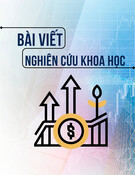
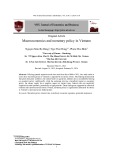
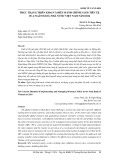
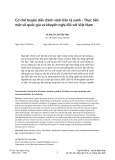
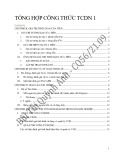

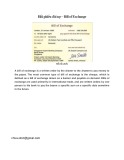
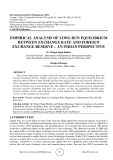
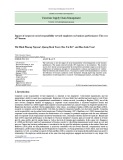








![Câu hỏi ôn tập Tài chính tiền tệ: Tổng hợp [Mới nhất]](https://cdn.tailieu.vn/images/document/thumbnail/2025/20251230/phuongnguyen2005/135x160/49071768806381.jpg)



![Câu hỏi ôn tập Tài chính Tiền tệ: Tổng hợp [mới nhất/chuẩn nhất]](https://cdn.tailieu.vn/images/document/thumbnail/2025/20251015/khanhchi0906/135x160/49491768553584.jpg)


